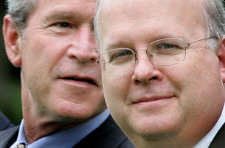Rove Concealed Top Secret Paper Warning Bush Iraq Intelligence False... All "About Getting Past The Election
 Excuse me, Who the hell is the President of the US of A, can some one tell me.
Excuse me, Who the hell is the President of the US of A, can some one tell me.National Journal Murray Waas Posted March 30, 2006 02:12 PM
READ MORE: George W. Bush, Karl Rove, Iraq
Karl Rove, President Bush's chief political adviser, cautioned other White House aides in the summer of 2003 that Bush's 2004 re-election prospects would be severely damaged if it was publicly disclosed that he had been personally warned that a key rationale for going to war had been challenged within the administration. Rove expressed his concerns shortly after an informal review of classified government records by then-Deputy National Security Adviser Stephen J. Hadley determined that Bush had been specifically advised that claims he later made in his 2003 State of the Union address -- that Iraq was procuring high-strength aluminum tubes to build a nuclear weapon -- might not be true, according to government records and interviews.
Hadley was particularly concerned that the public might learn of a classified one-page summary of a National Intelligence Estimate, specifically written for Bush in October 2002. The summary said that although "most agencies judge" that the aluminum tubes were "related to a uranium enrichment effort," the State Department's Bureau of Intelligence and Research and the Energy Department's intelligence branch "believe that the tubes more likely are intended for conventional weapons."
Read Whole Story




0 Comments:
Post a Comment
<< Home